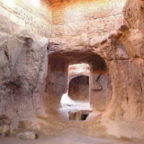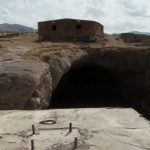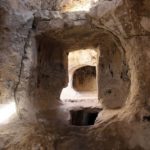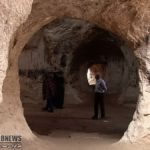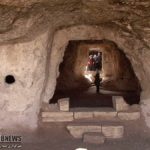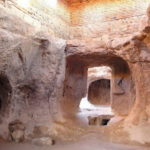Mehr Temple of Maragheh
The Mehr temple is located near the Verjuy village of Marāgheh (eastern Azerbāijān region) and was the place of worship of Mithras. It dates back to the time of the Parthians and is a stone-rock building located under an ancient cemetery known to the inhabitants of the area by other names such as: khānqāh, Imāmzādeh Ma'sum-e Marāgheh, Ojāgh va Ouliā.
This place includes the temple, the cemetery, the stable and the chellekhāne (place of prayer and meditation). The building was built underground and with the exception of the entrance which has a sloping structure, it has no other access. The arches and the different parts around the great hall of this temple show that it was one of the largest temples of its kind.
In the excavations carried out it was evident that this place had some stairs dating back to the Ilkhanid period but with the passage of time and with the crumbling of the ground, they have turned into a sloping surface.
Currently, to enter the building, you need to go down some steps to reach the central hall. To the left of the entrance is carved in stone an image similar to flowers and leaves but considering the tip and the end of it, it is also similar to a snake.
To the left of the entrance in the heart of the rock a square-shaped space has been dug with the dimensions of 10 x10 meters and in the center there is a massive column with eight sides that divides this large room into four parts.
At the top of each of these parts, there is a skylight that illuminates the place adequately. The eastern part of this rock has a small room whose ceiling has similarities with that of the Marāgheh observatory.
Here are written Koranic verses in characters Suns. In the Mehr temple there is another building that is part of the mausoleum Mollā Ma'sum Marāghei (one of the great scientists of the eighteenth century of the Hijra moon) which is a place of pilgrimage for the locals.
This temple was also once a gathering place for the mystics and followers of Sheikh Safi Al-Din Ardabili.

